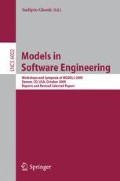Abstract
The complexity of embedded systems can partly be handled by models and domain-specific languages (DSLs) like Matlab/Simulink. If we want to apply such techniques to families of similar systems, we have to describe their variability, i.e., commonalities and differences between the similar systems. Here, approaches from Software Product Lines (SPL) and variability modeling can be helpful. In this paper, we discuss three challenges which arise in this context: (1) We have to integrate mechanisms for describing variability into the DSL. (2) To efficiently derive products, we require techniques and tool-support that allow us to configure a particular product and resolve variability in the DSL. (3) When resolving variability, we have to take into account dependencies between elements, e.g., when removing Simulink blocks we have to remove the signals between these blocks as well. The approach presented here uses higher-order transformations (HOT), which derive the variability mechanisms (as a generated model transformation) from the meta-model of a DSL.
Access this chapter
Tax calculation will be finalised at checkout
Purchases are for personal use only
Preview
Unable to display preview. Download preview PDF.
References
Clements, P., Northrop, L.M.: Software Product Lines: Practices and Patterns. The SEI series in software engineering. Addison-Wesley, Boston (2002)
Pohl, K., Boeckle, G., van der Linden, F.: Software Product Line Engineering: Foundations, Principles, and Techniques. Springer, New York (2005)
Beuche, D., Weiland, J.: Managing flexibility: Modeling binding-times in Simulink. In: [27], pp. 289–300
Eclipse-Foundation: Xtext, http://www.eclipse.org/Xtext/
Polzer, A., Botterweck, G., Wangerin, I., Kowalewski, S.: Variabilitaet im modellbasierten Engineering von eingebetteten Systemen. In: 7th Workshop Automotive Software Engineering, collocated with Informatik 2009, Luebeck, Germany (September 2009)
Botterweck, G., Polzer, A., Kowalewski, S.: Interactive configuration of embedded systems product lines. In: International Workshop on Model-driven Approaches in Product Line Engineering (MAPLE 2009), colocated with the 12th International Software Product Line Conference, SPLC 2008 (2009)
Kang, K., Cohen, S., Hess, J., Novak, W., Peterson, S.: Feature oriented domain analysis (FODA) feasibility study. SEI Technical Report CMU/SEI-90-TR-21, ADA 235785, Software Engineering Institute (1990)
Czarnecki, K., Eisenecker, U.W.: Generative Programming. Addison Wesley, Reading (2000)
Schobbens, P.Y., Heymans, P., Trigaux, J.C.: Feature diagrams: A survey and a formal semantics. In: 14th IEEE International on Requirements Engineering Conference. RE 2006, pp. 136–145 (2006)
Voelter, M., Groher, I.: Product line implementation using aspect-oriented and model-driven software development. In: 11th International Software Product Line Conference (SPLC 2007), Kyoto, Japan (September 2007)
Hotz, L., Wolter, K., Krebs, T., Nijhuis, J., Deelstra, S., Sinnema, M., MacGregor, J.: Configuration in Industrial Product Families - The ConIPF Methodology. IOS Press, Amsterdam (2006)
Deelstra, S., Sinnema, M., Bosch, J.: Product derivation in software product families: a case study. The Journal of Systems and Software 74, 173–194 (2005)
Czarnecki, K., Antkiewicz, M.: Mapping features to models: A template approach based on superimposed variants. In: Glück, R., Lowry, M. (eds.) GPCE 2005. LNCS, vol. 3676, pp. 422–437. Springer, Heidelberg (2005)
Botterweck, G., Lee, K., Thiel, S.: Automating product derivation in software product line engineering. In: Proceedings of Software Engineering 2009 (SE 2009), Kaiserslautern, Germany (March 2009)
Botterweck, G., O’Brien, L., Thiel, S.: Model-driven derivation of product architectures. In: Proceedings of the twenty-second IEEE/ACM international conference on Automated software engineering (ASE 2007), Atlanta, GA, USA, pp. 469–472 (2007)
Eclipse-Foundation: ATL (ATLAS Transformation Language), http://www.eclipse.org/m2m/atl/
Heidenreich, F., Kopcsek, J., Wende, C.: Featuremapper: Mapping features to models. In: ICSE Companion 2008: Companion of the 13th international conference on Software engineering, pp. 943–944. ACM, New York (2008)
Eclipse-Foundation: EMF - Eclipse Modelling Framework, http://www.eclipse.org/modeling/emf/
openarchitectureware.org: Official open architecture ware homepage, http://www.openarchitectureware.org/
Polzer, A., Kowalewski, S., Botterweck, G.: Applying software product line techniques in model-based embedded systems engineering. In: 6th International Workshop on Model-based Methodologies for Pervasive and Embedded Software (MOMPES 2009), Workshop at the 31st International Conference on Software Engineering (ICSE 2009), Vancouver, Canada (May 2009)
Pure::systems: pure::variants Connector for Simulink
Weiland, J., Richter, E.: Konfigurationsmanagement variantenreicher simulink-modelle. In: Informatik 2005 - Informatik LIVE!, Band 2. Koellen Druck+Verlag GmbH, Bonn (September 2005)
Kubica, S.: Variantenmanagement modellbasierter Funktionssoftware mit Software-Produktlinien. PhD thesis, Univ. Erlangen-Nürnberg, Arbeitsberichte des Instituts für Informatik, Friedrich-Alexander-Universität Erlangen Nürnberg (2007)
Tisi, M., Jouault, F., Fraternali, P., Ceri, S., Bézivin, J.: On the use of higher-order model transformations. In: [27], pp. 18–33
Oldevik, J., Haugen, O.: Higher-order transformations for product lines. In: 11th International Software Product Line Conference (SPLC 2007), Washington, DC, USA, pp. 243–254. IEEE Computer Society, Los Alamitos (2007)
Wagelaar, D.: Composition techniques for rule-based model transformation languages. In: Vallecillo, A., Gray, J., Pierantonio, A. (eds.) ICMT 2008. LNCS, vol. 5063, pp. 152–167. Springer, Heidelberg (2008)
Paige, R.F., Hartman, A., Rensink, A. (eds.): ECMDA-FA 2009. LNCS, vol. 5562. Springer, Heidelberg (2009)
Author information
Authors and Affiliations
Editor information
Editors and Affiliations
Rights and permissions
Copyright information
© 2010 Springer-Verlag Berlin Heidelberg
About this paper
Cite this paper
Botterweck, G., Polzer, A., Kowalewski, S. (2010). Using Higher-Order Transformations to Derive Variability Mechanism for Embedded Systems. In: Ghosh, S. (eds) Models in Software Engineering. MODELS 2009. Lecture Notes in Computer Science, vol 6002. Springer, Berlin, Heidelberg. https://doi.org/10.1007/978-3-642-12261-3_8
Download citation
DOI: https://doi.org/10.1007/978-3-642-12261-3_8
Publisher Name: Springer, Berlin, Heidelberg
Print ISBN: 978-3-642-12260-6
Online ISBN: 978-3-642-12261-3
eBook Packages: Computer ScienceComputer Science (R0)

